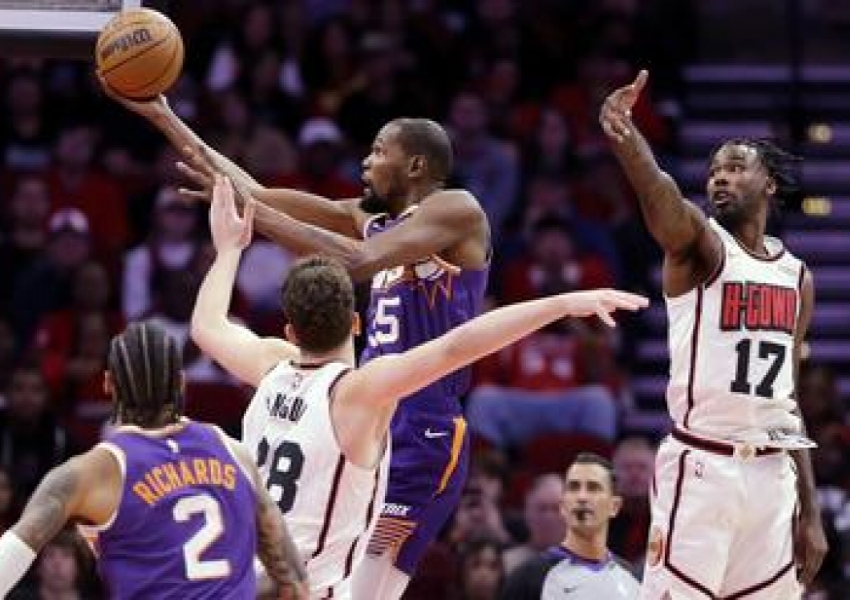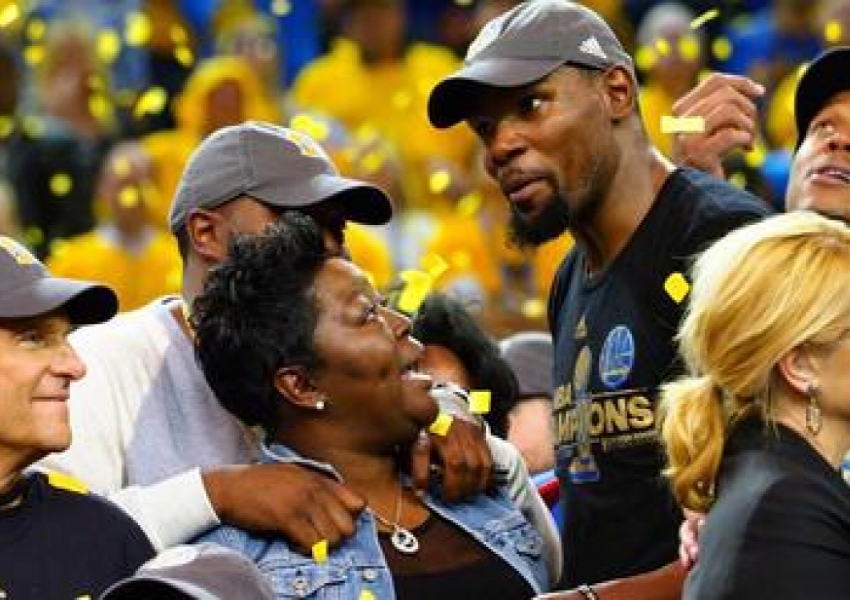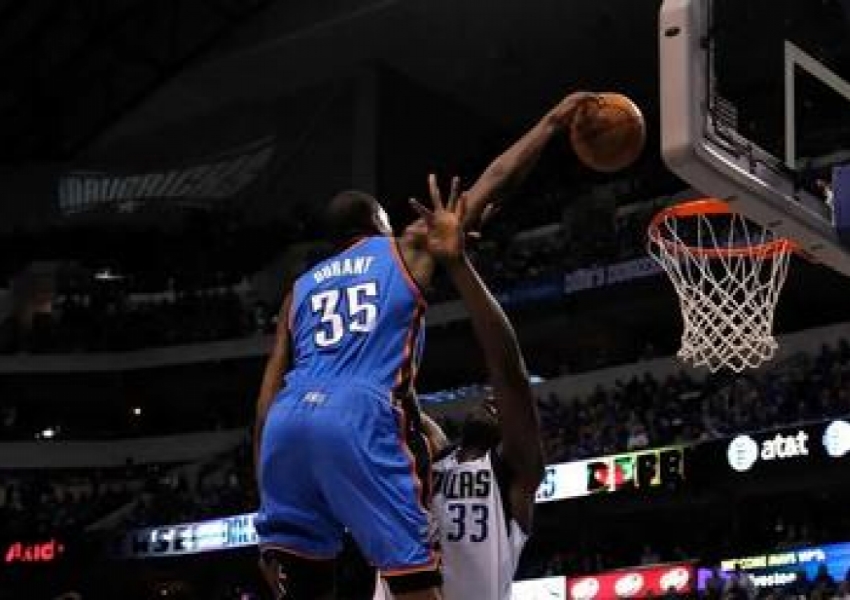The "Grim Reaper" from the Ghetto: From Abandonment to Underestimation, to Being Revered
Kevin Durant's life is a story that’s far from ordinary. His journey from the depths of poverty to becoming one of the greatest basketball players the world has ever seen is filled with hardship, sacrifice, and an unrelenting drive to overcome every obstacle placed in his path. Born in Southeast Washington, D.C., Durant’s childhood was far from idyllic. His story starts in a rundown, rain-leaking apartment, where his father, Wayne, abandoned the family when Durant was just eight months old. Left to raise Kevin and his older brother, Wanda Durant became both a mother and a father to her sons. Every day, Wanda worked tirelessly at four different jobs just to keep food on the table and a roof over their heads. From working as a sorter at the post office in the morning to driving a school bus, cleaning houses in the afternoon, and serving as a nurse at night, Wanda had no time for rest. The exhaustion from these back-to-back shifts would often cause her to fall asleep sitting in a chair, her arms shaking from the fatigue. Durant still vividly remembers the image of his mother trembling as she counted coins.

Despite Wanda’s tireless efforts, the Durant family often couldn’t make ends meet. For instance, there were times when they couldn’t afford to pay their electricity bill, forcing them to huddle together in darkness. Durant recalls those moments with sorrow, and as a young boy, he promised himself that he would one day buy his mother a big house with a garden. He also wrote in his diary, “I will make sure my mom never has to struggle again.” The family was evicted from their apartment 11 times during Durant's childhood. Sometimes, the only place to sleep was on a makeshift “bed” built from luggage.

Although their situation was dire, Durant always had basketball to keep him going. His mother, understandably concerned about the safety of their neighborhood, would lock Durant and his brother inside their apartment to keep them away from the dangers outside. But young Kevin, full of energy and determination, would break the window to sneak out and play basketball on the local courts. Despite his slender build and lack of coordination, Durant continued to hone his skills, practicing relentlessly even when his friends mocked him, calling him a "bamboo pole" and suggesting he should try volleyball instead of basketball. The taunts hurt, but Durant never shared his pain with his mother or his brother. Instead, he practiced alone under streetlights, dribbling endlessly until his skills began to shine through. At the age of 11, Durant led his team, the Prince George's County Jaguars, to a national championship, scoring 18 points in the second half of the final.

Wanda, recognizing her son's potential, went to great lengths to ensure he could pursue his passion for basketball. She contacted coach Taras Brown, begging her to take Durant under her wing. After much persuasion, Coach Brown agreed to take him on, and Durant was put on an intensive eight-hour-a-day training regimen. The catch was that Durant had to commute two hours each way to the gym, an exhausting four-hour round trip. Wanda never hesitated. She drove her son back and forth every day, eating and sleeping in the car. “Mom told me not to worry about the gas money, but I knew she was secretly selling blood to pay for it,” Durant tearfully recalled in a documentary.
Wanda's sacrifices were not in vain. Under Coach Brown's guidance, Durant’s game rapidly improved, earning him a scholarship to the prestigious National Christian Academy, where he was coached by the legendary Stu Vetter. At the academy, Durant’s game reached new heights, averaging 23.6 points and 10.9 rebounds per game. He was invited to the McDonald's All-American Game, where he won MVP honors. By the time he graduated, Durant had firmly established himself as a basketball prodigy.
Durant’s decision to attend the University of Texas was largely influenced by head coach Rick Barnes, who promised him the role of the team's focal point. At just 18 years old, Durant was the centerpiece of the Longhorns, leading them to a 25-10 record and earning numerous accolades, including the AP Player of the Year, the Naismith College Player of the Year, and the Wooden Award. His stats—25.8 points and 11.1 rebounds per game—were eye-popping, and he was universally regarded as the top prospect in the NBA draft. However, despite his impressive resume, the Portland Trail Blazers, holding the No. 1 overall pick in the 2007 draft, chose Greg Oden instead, a decision that would forever be a blemish on the franchise's history.
Many critics at the time doubted Durant’s ability to survive in the NBA. His slender frame and weak bench press numbers—only 84 kilograms—led some to question whether he could compete in the physical nature of the league. Yet, Durant’s sheer skill and versatility quickly silenced the doubters. His exceptional shooting touch and basketball IQ allowed him to dominate from day one. In his rookie season, he averaged 20.3 points per game, relying largely on his ability to shoot from all over the floor. By his second season, Durant had added muscle to his frame, and his game had evolved to the point where he became an elite scorer, averaging more than 25 points per game.
Durant’s journey from overlooked rookie to perennial All-Star was not without its setbacks. In 2016, Durant made a controversial decision to join the Golden State Warriors, a move that was met with backlash from fans and the media. Critics accused him of “joining a super team” and taking the easy route to a championship. However, Durant proved them wrong. He won back-to-back NBA Finals MVPs, and his dominant performances in the 2017 and 2018 Finals silenced any remaining critics. Durant’s efficiency and scoring prowess were unmatched, earning him the nickname “The Slim Reaper.”
In 2019, Durant left the Warriors to join the Brooklyn Nets, eager to build his own legacy after suffering a devastating Achilles injury that many believed would mark the end of his career. Yet, Durant defied all odds. Despite concerns about his recovery, he came back even stronger, and his performances since then have been nothing short of spectacular. Durant has continued to dominate in the NBA, showcasing his ability to score, defend, and elevate his teammates.
Beyond his basketball career, Durant’s story is a testament to resilience, hard work, and humility. Despite amassing a fortune through his career, he has remained grounded. He still lives in a modest apartment and has built a reputation for his philanthropy, donating millions to charity and funding 23 basketball courts in his hometown. Durant has also remained close to his roots, crediting his mother for the sacrifices she made to ensure his success.
Kevin Durant’s story is one of overcoming adversity at every turn. From being abandoned by his father to growing up in poverty, to proving his doubters wrong in the NBA, Durant has shown that no matter the obstacles, hard work and determination can lead to greatness. His journey from the ghetto to the pinnacle of basketball is an inspiring example of how perseverance and love for the game can change one’s destiny. Through it all, Durant has never forgotten where he came from and has used his success to give back to those who helped him along the way. His legacy is not just about basketball—it's about the heart and determination of a young boy who once slept on a bed made of luggage but dreamed of a better life for his mother.
“People always talk about my place in history,” Durant once said. “I just want to tell that kid who slept in a suitcase bed: you did it.” This statement encapsulates the essence of Durant’s journey, a journey that will inspire generations to come.
Copyright Statement:
Author: focusnba
Source: FocusNBA
The copyright of this article belongs to the author. Reproduction is not allowed without permission.
Recommended Blog
- From Locker Room Wildcard to Championship Firewall: Why Bobby Portis Is Worth $48.5M Over 4 Years
- The Leaders Are Gone, The Team Rebuilds in a Month, Yet Finds Itself in the Playoff Hunt
- The Ultimate Underdog Story: From Unranked High School Player to NBA’s Elite 3D Threat
- 77-23! The MVP Race, Has It Already Been Decided?
- 34+15+5! Davis' Historic Game Lands Him in Mavericks' Lore, Can Dallas Achieve a "Black Eight" Upset?
- A Crime of a Game! What Level is 36-Year-Old Westbrook Really At?
- 52+10+8+5! What Level Is Curry At Right Now?
- Plus-Minus +219! Did Pelinka Pull Off Another Masterstroke by Acquiring Finney-Smith?
- Late-Season Surge! Can 2024’s Top Pick, Rashaé, Still Win Rookie of the Year?
- Unstoppable! What Level Is Jalen Green Really Playing At With 25.8 Points Over the Last 10 Games?
Hot Blog
- A Complete Transformation! Does Cade Cunningham Deserve an All-NBA Spot This Season?
- Awkward! Did Anthony Davis Just Expose the Mavericks’ Hypocrisy—and Is He Thinking About Leaving?
- 18 Misses, Just 2 Makes: Donovan Mitchell’s Worst Game of the Season—Is He Really MVP-Worthy?
- What Looked Like a Steal Turned Into a Disaster: Suns’ Offseason Gamble Backfires, $15 Million Down the Drain
- LeBron's Game-Winning Shot! Streak Almost Broken, One Play to Redeem Himself!
- Life After the Lakers: What’s Happening to D’Angelo Russell?
- Another Season Lost! Robert Williams' Brutal Injury Woes: Can He Still Prove Himself?
- Peak Zubac! Just How Good Is the Clippers' 28-Year-Old Big Man?
- Only Six Games Left! Why Haven’t the Lakers Converted Goodwin’s Contract Yet?
- DNP Streak Continues! Just How Bad Has Alex Len Been for the Lakers?